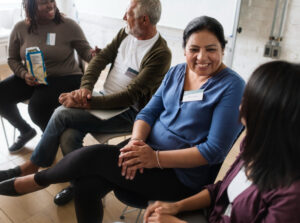About the course
Psychological therapies for people with severe mental health problems are a key part of the integrated offer for adults, as set out in the NHS Long-Term Plan. The Mental Health Implementation Plan and subsequent Community Mental Health Framework for Adults and Older Adults, provides a new framework to ensure services are integrated, place-based and designed to meet specific local need.
For those experiencing severe and/or complex mental health problems, the Framework advocates the provision of NICE-recommended psychological therapies and views these as critical in giving people the best chance to get better and to stay well. Funding to commission new courses has been made available to Health Education England (HEE) through NHS England (NHSE), and a national curriculum has been agreed for the training based on the best available evidence.
The Meriden Family Programme is one of only four training providers commissioned to deliver across England and is offering a 12-month training programme via Microsoft Teams to staff working in community adult or older adult services. The training will equip practitioners with the skills to deliver evidence-based face-to-face Family Intervention (FI) sessions, as well as remote working where necessary.
Important note
This programme of training is specifically linked with the Community Mental Health Transformation agenda. The existing Meriden Family Programme 5-day training programme will remain valid and will run in parallel to the new HEE commissioned training. For existing BFT trainers and supervisors, any training plans and supervision provided should continue.
The Meriden Family Programme will be involved in on-going discussions with HEE and others regarding developing standards for CMHTs in the future and will keep current trainers and supervisors informed about these.
Who is the training aimed at and what is included?
Upskilling the adult and older adult community mental health workforce is central to the strategy to improve timely access to a range of evidence-based psychological therapies, including FI. Applications will be considered from individuals who meet all of the following requirements. Participants should be:
- Registered health care professionals with a core mental health profession including mental health nurses, allied health professionals, social workers, psychiatrists, and psychological professionals.
- Working in secondary care community adult or older adult mental health services and should have at least two years’ experience of working with psychosis and bipolar disorder.
- Able to work with a minimum of 2 families during the course.
- Able to commit to 10 taught days and 12 supervision sessions over a 12 month period.
- Fully backed by their host organisation.
- In a position to both cascade information and supervise staff in BFT and family sensitive practice following completion of the course.
Will the training be online or face-to face?
The training will be delivered online via Microsoft Teams. This will include all induction, pre-course/additional meetings, taught days and supervision throughout the duration of the course.
What does the training include?
This course covers both the theory and practice of Behavioural Family Therapy (BFT). Participants on the course will be introduced to theoretical aspects of the approach, and to the similarities and differences between BFT and other evidence-based psychosocial and psychoeducational approaches to working with families under stress.
The first half of the training will consist of participants learning the skills which constitute the BFT approach, with specific emphasis on the application of the model for those experiencing Psychosis or Bipolar Disorder. These skills are taught in a very practical way. Participants will be expected to bring material from their own caseloads to work on throughout the course.
Additional topics covered on the course include the provision of carer psychoeducation and support, developing a family sensitive organisation and the supervision of others in the application of BFT for Psychosis and Bipolar Disorder. The training does not cover the skills required to become a trainer in BFT but will cover models of clinical supervision and staff support.
What are the course requirements?
Applicants must be able to demonstrate the ability to meet the above course requirements and have full backing from their host organisation.
Applicants must have the ability to work clinically with families for the duration of the course and be in a position to supervise others following completion of the training. Assessment will be undertaken through a combination of observation, assignments and case studies.
How to apply
Places on courses are allocated by regional leads. To register your interest, please complete the form on the booking page and your details will be forwarded to the lead in your area.
Feedback on the course from previous a previous delegate can be found here: Review of our Family Intervention for Psychosis & Bipolar Course – Meriden Family Programme

